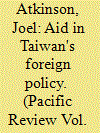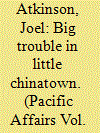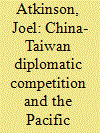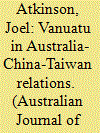|
|
|
Sort Order |
|
|
|
Items / Page
|
|
|
|
|
|
|
| Srl | Item |
| 1 |
ID:
131354


|
|
|
|
|
| Publication |
2014.
|
| Summary/Abstract |
Taiwan's foreign aid policy is largely a response to its China-imposed international isolation. Taiwan provides aid without stringent accountability conditions to countries in Africa, the Americas, and the South Pacific in order to maintain official diplomatic relations in the face of Chinese opposition. Often at odds with this is Taiwan's interest in seeking western support through being seen as a responsible aid donor. Domestic political constraints on Taiwan's aid budget accentuate the tension between these two interests. Taiwan's aid program can be seen as the product of these three competing and enduring pressures - maintaining the count of official diplomatic relationships, improving its international reputation, and containing aid spending.
Taiwan President Ma Ying-jeou's tacit 'diplomatic truce' with China - part of a wider warming of intergovernmental relations across the Taiwan Strait - has reduced significantly the squeeze between these three pressures on Taiwan's foreign aid policy. It has allowed the Ma administration to improve Taiwan's reputation, while maintaining or even reducing its aid expenditure, and still retain the same number of official diplomatic relationships. Nevertheless, the Ma administration has not wanted to alienate recipient governments while the prospects for the diplomatic truce with China remain uncertain. There remains considerable continuity with past practices, and the government's handling of aid as a foreign policy tool is still largely opaque and unaccountable.
|
|
|
|
|
|
|
|
|
|
|
|
|
|
|
|
| 2 |
ID:
088721


|
|
|
|
|
| Publication |
2009.
|
| Summary/Abstract |
Taiwan's effort to carry on diplomatic relations in the face of hostility from China has collided with Australia's reform agenda for the Pacific Islands. This issue is particularly acute in Solomon Islands, which has longstanding ties with Taiwan and a close association with Australia. In the lead-up to the April 2006 elections in Solomon Islands, a local politician accused Taiwan of funding candidates. The same politician later stated that popular anger towards Taiwan sparked the post-election riot that devastated Honiara's Chinatown. Although neither of these accusations was supported with evidence, they prompted Australia to publicly criticize Taiwan's involvement in Solomon Islands. This article argues Australia's reaction was due to existing Australia-Taiwan tension over the South Pacific, and because Australian policymakers found Taiwan a more palatable focus than acknowledging the ambitious reach of Australia's reform efforts. Australia's rhetoric drew a negative reaction from Taiwan, which believed Canberra was seeking a scapegoat to deflect from its inability to anticipate or control the riot. The incident also contributed to the Taiwan government's perception of Australia as increasingly pro-China. Despite subsequent efforts from Taiwan and Solomon Islands to improve accountability for Taiwan's aid, the differing interests of Australia and Taiwan continued to be an issue as funding from Taiwan became more important to Solomon Islands Prime Minister Sogavare during his dispute with Australia. This article examines the interaction between Australia and Taiwan over Solomon Islands, and considers its significance to wider Australia-Taiwan involvement in the South Pacific.
|
|
|
|
|
|
|
|
|
|
|
|
|
|
|
|
| 3 |
ID:
097772


|
|
|
|
|
| Publication |
2010.
|
| Summary/Abstract |
China and Taiwan have become important actors in South Pacific affairs due to their diplomatic rivalry. Securing the diplomatic recognition of the Pacific Islands countries is expensive for China and Taiwan. There are limits to what the rivals are willing to spend, and they attempt to reduce costs. This dynamic shapes how Taiwan and China engage Pacific Islands politicians. It also motivates their high level official visits to the region, and how they engage South Pacific regional organizations. Despite criticisms that China-Taiwan rivalry corrupts and destabilizes the South Pacific, the issue of whether China and Taiwan's diplomatic rivalry has been beneficial or detrimental to the region remains contentious. China and Taiwan appear to have recently called a truce in their decades-old rivalry. This tacit agreement is still tentative, and the involvement of China and Taiwan in the region has yet to change significantly. However, Taiwan has reportedly begun to reduce funding, and is likely to reform its aid delivery in order to satisfy demands from the South Pacific region's dominant power, Australia, and to improve its image as a humanitarian aid donor. China is also likely to reduce funding while the truce holds. However, China considers its ties with South Pacific governments more important than responding to Australian pressure, and is unlikely to reform its South Pacific aid programmes as a result of the diplomatic truce.
|
|
|
|
|
|
|
|
|
|
|
|
|
|
|
|
| 4 |
ID:
079850


|
|
|
|
|
| Publication |
2007.
|
| Summary/Abstract |
Vanuatu became a major issue in Australia-China-Taiwan relations during Serge Vohor's turbulent prime ministership in 2004. Already engaged in a struggle with Australia over 'good governance', Vohor signed an agreement diplomatically recognising Taiwan. Chinese and Australian pressure led to Vohor's ouster, and a diplomatic setback for Taiwan. Although Australia and Taiwan viewed each other as side issues in this episode, with Australia focused on Vohor and Taiwan on China, their interests were directly opposed during the episode. As became evident in the aftermath of the post-election riot in Solomon Islands in April 2006, these divergent positions have had a lasting negative impact on each country's perception of the other. The key events of 2004 are examined here to demonstrate how this episode has affected the wider landscape of Australia-China-Taiwan relations
|
|
|
|
|
|
|
|
|
|
|
|
|
|
|
|
|
|
|
|
|